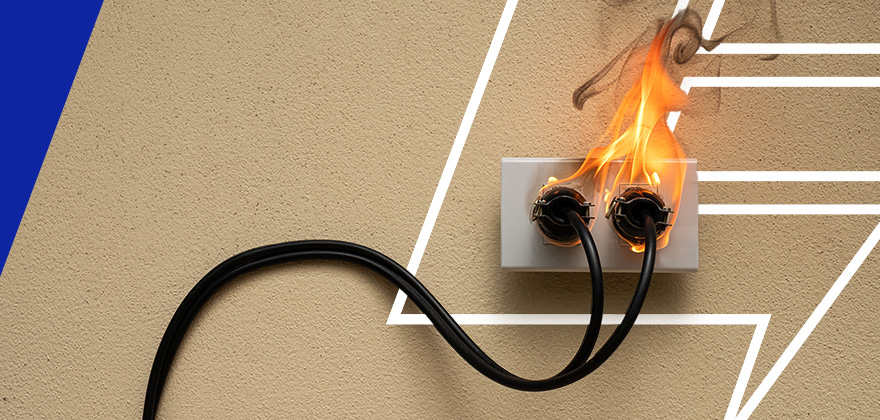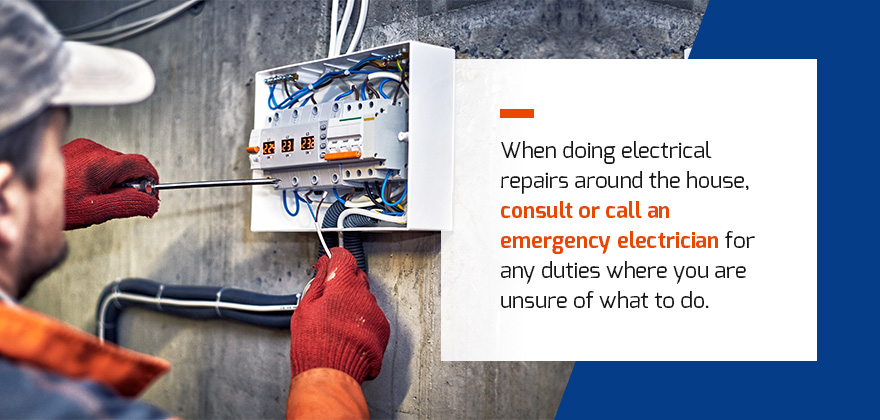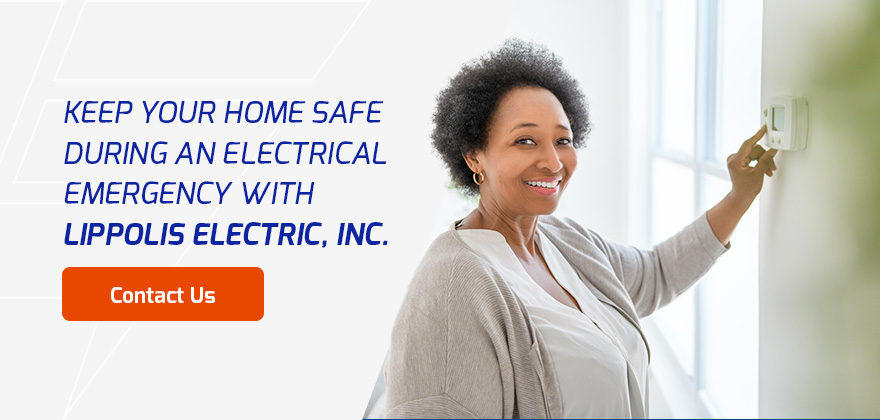What You Should Do During an Electrical Emergency

Essential Steps for Handling Electrical Emergencies
Electrical appliances are staples of modern convenience. Where would we be without electric ovens to prepare our food, washers and dryers to clean our clothes and lights illuminating our way in the dark? Electricity is an absolute must in the modern world, but numerous risks and potential hazards come with it. Anything from a frayed cord to an overloaded circuit can cause a short or a spark and put your family at risk.
Though you’re better protected from electrical emergencies when a professional regularly maintains your home’s systems and appliances, your household must understand what to do if these issues happen.
Below are some basic procedures to help you create an emergency response plan for various electrical incidents.
Electrical Emergency? Call Lippolis Electric Now
What to Do in Case of an Electrical Fire
Dealing with electrical fires can be very dangerous. An emergency response plan, like the one below, is key to keeping your family safe:
- Cut the power: If you suspect a possible fire, the first thing you should do in any electrical fire is cut the power to the electrical system causing the problem. You can do this by flipping the switch on your home’s breaker box. Simply unplugging the appliance or flipping the switch still poses a risk, especially if the cause is a frayed wire or overheated appliance. Turning off the power can stop the fire before it starts.
- Use a fire extinguisher: If you cannot cut the power to the source of the fire, you should only use a Class C-rated fire extinguisher. These use carbon dioxide or dry chemical extinguishers. If the power is cut, you should use a Class A extinguisher, which is water-based. Pull the pin depressing the handle and point the horn at the base of the fire before holding down the handle. Continue dispersing the chemical until you extinguish the fire fully.
- Smother the fire: If you do not have a fire extinguisher, you need to know how to put out an electrical fire without one. If the power to the area is off, you can use either a fire blanket or water to extinguish the fire. However, if you cannot turn off the power or are unsure whether the power is off, do not use water or approach the fire in case of electric shock.
- Practice fire safety: If you cannot control the fire, exit the building as quickly and calmly as possible before calling authorities. Remember to keep close to the ground to avoid smoke inhalation, and stop, drop and roll if your clothing catches fire.
- Call 911 and exit: Always call 911 in the event of a fire, even if the fire is out. Smoldering objects can reignite, especially if you are unable to cut power to the fire’s source.
Many homeowners are unaware that breaker panels are often labeled incorrectly. Test your service panels to ensure the labels are accurate and that you can shut the power off in an emergency.
Though knowing what to do in the event of an electrical fire is a good idea, taking steps to prevent such fires is even more important. Avoid electrical fires by keeping flammable materials away from outlets, especially outlets currently in use. If you are using a power strip, be sure not to overload them, and never connect a string of strips together. You may also consider using surge protectors to help safeguard your electronics from overheating from a power surge.
Electrical Shock Emergency Management
Contact with electricity sometimes happens, especially when electrical outlets and cords go without maintenance or if electrical appliances are near water. These cases can be particularly frightening, but it’s crucial to have electric shock emergency procedures for your household in the event of an accident.
Here are a few things to keep in mind for your emergency response plan:
- Do not touch: If someone comes in contact with electricity, under no circumstances should you touch them directly. If you contact that person while they are still connected to the electrical current, you will also get shocked or electrocuted. Stay calm and stay away.
- Keep your distance: If the cause of electrocution is a high-voltage wire, stay at least 20 feet away from the wire. If the wire is jumping and sparking, stand even further away if possible.
- Turn off the power: As soon as you are aware of the contact with electricity, turn off the power to that part of the house. Do this as quickly as you can.
- Cut contact with the person: If it takes too long to reach the breaker, try to cut contact between the person and the electrical source using an insulated object. A wooden rod, PVC pipe or other material would work well. Never use a wet or damp object. The longer the person is in contact with the shock, the more likely it will be fatal. Once the person is away from immediate danger, do not attempt to move them any further.
- Call for help: Once you have turned off the power or removed the person from the source of the shock, immediately call 911 for help. If you have first aid or CPR training, administer it to the victim. If you do not have training, the 911 operator can give you directions until a responder arrives. Do this even if the victim says they feel fine — electric shock may not be immediately visible or noticeable, even to the victim.
Which Procedures Should You Follow to Protect Against Electrocution?
Preventing electric shocks is the most important part of your emergency response plan. If you have small children, cover all outlets with protectors and educate them on electrical safety as soon as they are old enough to understand.

When doing electrical repairs around the house, consult or call an emergency electrician for any duties where you are unsure of what to do. Additionally, you may want to consider installing a safety switch in your home. It will monitor the flow of electricity through a circuit and immediately shut off the circuit if it detects a problem. This can help prevent electrocution, as well as electrical fires.
Responding to Power Outages
Power failures are probably the most common electricity emergency on the list. They can occur for a variety of reasons. Whether it’s due to a storm, downed power line, energy shortage or a problem in your home’s power lines, blackouts can be a headache and dangerous for your home appliances.
In the event of a power failure, take the following steps to protect your home and family:
- Check the source: Sometimes, the cause of a blackout in your home is simply a short-circuit or tripped breaker. Check and reset your circuit breakers to ensure it isn’t at fault.
- Be prepared: Whether your area is prone to power outages or you’re expecting a bad storm, having a plan for a potential blackout brings you extra peace of mind. Keep a power outage emergency kit in an easily accessible location, equipped with alternative lighting options, like candles, alternative cooking and heating solutions, a battery-powered radio and fresh water supplies. You may also want a battery-powered mobile phone charging station to keep your lines of communication open.
- Turn off power to appliances: As soon as a power outage occurs, turn off power to all heating and cooling appliances, such as ovens, irons, heaters, air conditioners, and any electronics, via the circuit breaker. Turn off the branch circuits first, then the main breaker. Alternatively, ensure you plug all of your electronics into surge protectors so they are safe when the energy turns back on. Keep your food freezers and refrigerators closed to preserve the food inside as long as possible.
- Reset safely: When power returns to your building, wait a few minutes before turning on your lights and appliances. The energy returning to the grid could be inconsistent, potentially damaging your electronics if you turn them back on too quickly. Make sure to turn the main breaker back on first, then turn on the branch circuits.
Who to Call When the Power Goes Out
For quick action, we strongly recommend calling or logging onto your local utility’s webpage and reporting the outage. For Westchester residents, go to the Con Edison website or call their emergency number at (800) 752-6633.
If your home has a different power supplier, like New York State Electrical and Gas (NYSEG) or Eversource, check the first page of your utility bill for step-by-step guidance. They will need your name, street address and possibly your account number. If someone else has already reported the outage, you may receive an automated response from your utility stating they are aware and are working on it.
Contact Us For Electrical Repairs
Combatting Power Outages With Generators
If your house already has an automatic standby generator, you’ll have lighting and some limited power during an outage. Nothing provides more reassurance to you and your family during a mini-crisis than the knowledge the backup power supply is up and running. Smaller generators will cover the essentials, like heat, refrigeration, light and power in designated areas like kitchens and bathrooms. In contrast, a larger, whole-house generator will provide you with all the power you need throughout the year.
An alternative to a standby generator is a portable generator. A professional will install the equipment for standby options, making the transfer from utility to manual power and back again easy. Portable generators will provide just enough energy to power the essentials and get you and your loved ones through the emergency.
However, someone must be home to manually set up and start a portable generator. This is not the case with a standby option — you can be anywhere in the world, and these solutions will automatically kick in if an outage occurs.
Dealing With Fallen Power Lines
You should treat downed power lines with extreme caution, as they can pose a serious threat to you and your home. When near a fallen power line, keep the following in mind:
- Observe carefully: We tend to think of live lines as always sparking and letting off lights and sounds, but live power lines don’t always seem active. Even if you think the line is inactive, always treat it as an electricity hazard and stay at least 40 feet away. Be sure to check for any dangling cables, fallen or dangling limbs, puddles, vehicles, metal fences and other conductive materials that could pose an electricity hazard.
- Avoid trees: Trees in contact with power lines are dangerous, as living wood contains water and can be conductive. Even if you are not sure whether a line is in contact with a tree, avoid touching it or any material surrounding it.
- Keep others away: When possible, ward people away from the downed power line until help arrives. If you are in a vehicle, turn on your hazard lights, park a good distance away from the area and remain in your vehicle until help arrives. If you are a pedestrian, stand away from the area in a safe spot off the road. Advise others passing through that the line is down and help is on the way. Encourage them to avoid the area and take a different route if possible.
- Immediately contact authorities: When you notice a downed power line, you should immediately notify the local distribution company in charge of the line.
If your car comes in contact with a downed line, follow these safety rules:
- Stay inside the vehicle: Do not risk leaving your car. Even if you aren’t sure whether the line is live, avoid coming into contact with the outside of your car. Get out only when authorities tell you it is safe.
- Warn others: Roll your window down and tell people to stay away from the area. Anyone in contact with the equipment or ground could be seriously injured.
- Call for help: Call 911 as soon as possible. If you don’t have a phone, roll down your windows and sound the horn to call for help and explain the situation to passers-by.
- In case of a fire, exit safely: If your car or the surrounding area catches fire and poses an immediate threat to your life, exit the vehicle carefully. Remove any loose items of clothing, such as baggy jackets or scarves. Keep your hands at your sides and off the metal of your car, and get away from your vehicle. Keep your feet close together, with both feet touching the ground simultaneously, and shuffle away from the vehicle without picking up your feet until you are a good distance away from the vehicle.
If the downed power line is on your property, you’ll likely need to hire an electrician to fix the problem. A properly certified emergency electrician is the best choice.
The Importance of Professional Electrical Repairs
Relying on a professional, licensed electrician for emergency electrical services is always best when issues arise in your home. Explore the key reasons to hire an expert below:
- Safety: Working on electrical repairs alone can be a serious hazard for you, your family and your home. Avoid the danger and stick with an experienced technician who knows the best practices for efficiently and safely resolving these issues.
- Compliance: A trusted electrician will be familiar with local building codes and important compliance regulations, ensuring your home meets the necessary legal standards for safety and functionality.
- Long-term savings: Hiring a professional can save you money on future repairs and installations. Doing the work yourself can lead to premature and more frequent failures. An expert will prioritize quality workmanship and ensure they correct issues the first time.
- Peace of mind: When you work with a licensed electrician, your family can enjoy peace of mind knowing your home is safe and up to standard.
Contact Lippolis Electric for Emergency Assistance Today!
If you’re a homeowner in New York, New Jersey or Connecticut and need a residential electrician you can trust, Lippolis Electric, Inc. is here for you. We are a family-owned and operated business with 40 years of experience.
Our licensed, highly-trained electricians can take on any electrical repair job, no matter the size or scope. We want to help make your home safe for you and your family. Whether you’re dealing with sparking electrical outlets, a blown fuse, or a malfunctioning appliance, we have your back. We can also help you find a generator that is perfect for your home.
Contact us for more information on our emergency electrical repair services today.
Schedule a Comprehensive Electrical Safety Inspection

1 Comment:
Comments are closed.
Schedule service
Please note that your appointment is not set until confirmed by Lippolis Electric shortly after you've submitted the form.
| ‹ | › | |||||
| Sun | Mon | Tue | Wed | Thu | Fri | Sat |

I like what this article mentions about what to do in an electrical fire situation. I recently started a fire in my garage because of some wiring issues with the lights but luckily I was able to stop it. Keeping the power off until I can have an electrician come out to check it could be a good way to prevent any more problems from arising. Thanks for the post!